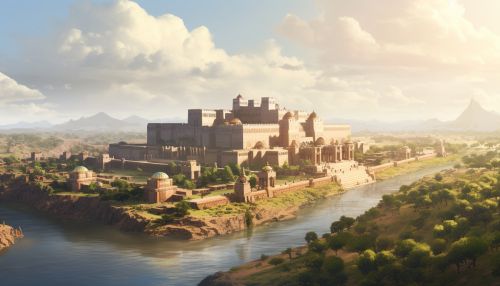Mesopotamian mythology
Origins and Development
Mesopotamian mythology originated in the ancient region of Mesopotamia, which is present-day Iraq, Kuwait, and parts of Syria, Iran, and Turkey. The mythology developed over several millennia, beginning with the Sumerians in the 4th millennium BCE, followed by the Akkadians, Babylonians, and Assyrians. The mythology and religious practices of these cultures were deeply intertwined, with myths serving as a means to explain natural phenomena, cultural practices, and societal norms.


Pantheon of Gods and Goddesses
The Mesopotamian pantheon was vast and complex, with hundreds of deities representing various aspects of the natural world, human emotions, and societal constructs. The gods were anthropomorphic, possessing human characteristics and emotions, and were often depicted in human form. They were also hierarchical, with a high god presiding over the pantheon. In early Sumerian mythology, this was the sky-god Anu, but in later Akkadian, Babylonian, and Assyrian mythology, the supreme deity was Marduk or Ashur.
Creation Myths
Mesopotamian mythology is rich in creation myths, stories that explain the origin of the universe, the earth, and life itself. The most famous of these is the Babylonian creation myth, the Enuma Elish, which tells of a primordial battle between the god Marduk and the sea-goddess Tiamat. After defeating Tiamat, Marduk uses her body to create the heavens and the earth.
Epic Narratives
Epic narratives form a significant part of Mesopotamian mythology. These include the Epic of Gilgamesh, one of the earliest known works of literature, which tells the story of the hero-king Gilgamesh and his quest for immortality. Another important epic is the Epic of Creation, which describes the creation of the world and the establishment of Marduk as the supreme deity.
Afterlife and Eschatology
The Mesopotamian view of the afterlife was generally bleak. The dead were believed to descend into a dark, dreary underworld ruled by the goddess Ereshkigal. There was no concept of judgment or moral retribution after death; all souls, regardless of their deeds in life, were destined for the same fate. Eschatological myths, dealing with the end of the world, are less prevalent in Mesopotamian mythology compared to other mythologies.
Influence on Other Cultures
Mesopotamian mythology had a profound influence on the mythologies and religions of other ancient Near Eastern cultures. Many of its themes, motifs, and deities were adopted by the Canaanites, Hittites, and Israelites, and later incorporated into Greek and Roman mythology.
